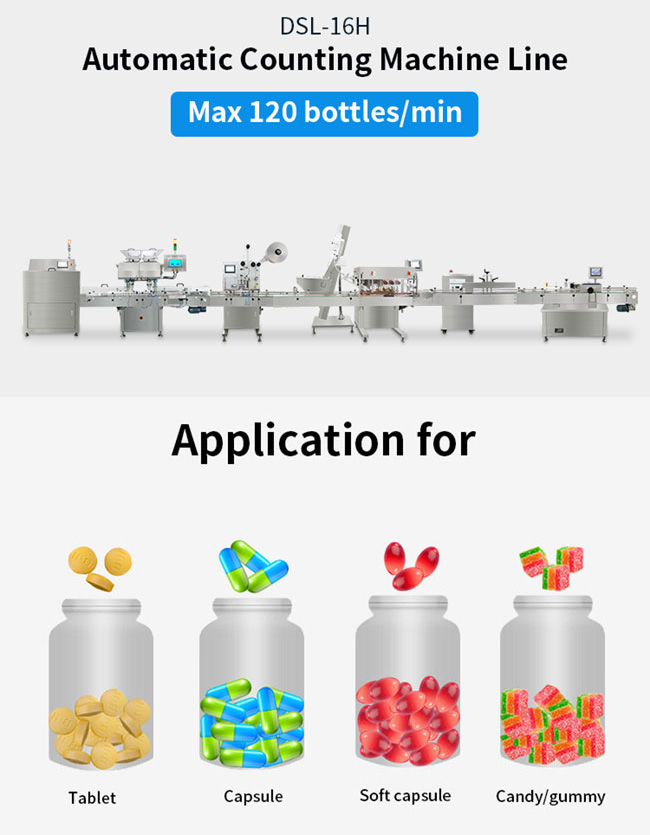Categories
New Blog
Tags
The global bottling industry is undergoing a paradigm shift, with the automatic counting bottling production line emerging as a game-changer for manufacturers. In an era where precision and speed define competitiveness, these automated systems are redefining operational standards across beverages, pharmaceuticals, and cosmetics sectors. This comprehensive analysis examines why 83% of Fortune 500 manufacturers now prioritize automated bottling solutions, focusing on seven transformative benefits that deliver measurable ROI.

Modern automatic bottle counting machines achieve production speeds of 400-800 bottles per minute – 3-5× faster than manual operations. Unlike traditional systems requiring human intervention for:
· Batch counting verification
· Bottle positioning adjustments
· Quality control pauses
Automated lines utilize synchronized servo motors and AI-powered vision systems to maintain continuous operation. A 2023 McKinsey report revealed automated bottling plants reduce downtime by 62% while increasing throughput by 41% annually.
Key Feature Spotlight:
· Integrated PLC controls enabling real-time speed adjustments
· Multi-lane parallel processing capabilities
· Predictive maintenance alerts via IoT sensors
In industries like pharmaceuticals where regulatory compliance is non-negotiable, automated counting bottling equipment delivers 99.98% counting accuracy through:
· Laser sensors detecting micro variations (up to 0.1mm precision)
· Weight-based redundancy checks
· Blockchain-enabled audit trails
Case Study: A European vaccine producer reduced labeling errors by 97% after implementing RFID-tagged automatic counters, saving $2.8M in annual recall costs.
While the initial investment ranges from $150,000 to $500,000, automated lines demonstrate ROI within 18-24 months by:
· Reducing staffing needs by 60-75% per shift
· Eliminating counting-related human errors costing $7.8B annually (FDA estimates)
· Enabling 24/7 production without overtime pay
Financial Breakdown:
|
Cost Factor |
Manual Line |
Automated Line |
|
Hourly Labor |
$45/hr |
$12/hr (1 supervisor) |
|
Error Rate |
2.3% |
0.05% |
|
Shift Output |
8,000 units |
34,000 units |
Automated systems address critical industry challenges:
· FDA 21 CFR Part 11 Compliance: Digital records with cryptographic signatures
· ISO 9001: Automated calibration protocols
· OSHA Safety: Elimination of repetitive strain injuries
Advanced features like emergency braking (response time <0.3s) and contamination-proof stainless steel surfaces make these lines ideal for sterile environments.
Modular automatic bottling systems allow seamless capacity upgrades:
· Phase 1: Start with 200 BPM (bottles per minute) configuration
· Phase 2: Add 3 more filling heads ($28,000 investment) to reach 750 BPM
· Phase 3: Integrate smart warehousing via AGV robots
This scalability helped craft breweries expand production 8-fold during seasonal peaks without capital overextension.
Modern systems reduce environmental impact through:
· Energy Recovery: Regenerative drives cutting power use by 35%
· Material Optimization: AI algorithms minimizing cap/foil waste by 22%
· Water Recycling: Closed-loop rinsing saving 1.2M gallons/year
A 2024 UNIDO study showed automated lines lower carbon footprint by 18 metric tons annually per production unit.
Industry 4.0 integration transforms bottling lines into profit centers:
· Real-Time Analytics Dashboard: Track OEE (Overall Equipment Effectiveness)
· Predictive Quality Control: Machine learning identifies defect patterns
· Supply Chain Integration: Auto-replenish materials via ERP links
Manufacturers report 15-30% yield improvements within 6 months of implementing data-capable systems.
Conclusion:
The automatic counting bottling production line is no longer optional – it's the cornerstone of modern manufacturing success. With payback periods shrinking below 20 months and technological advancements accelerating, delaying automation risks irreversible market share loss. Industry leaders agree: automated bottling systems deliver 23% higher profit margins while future-proofing operations against labor shortages and regulatory changes.